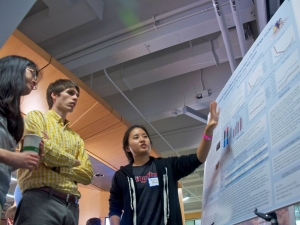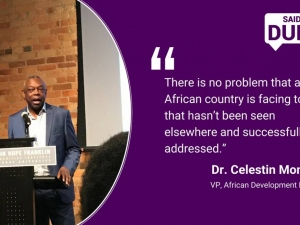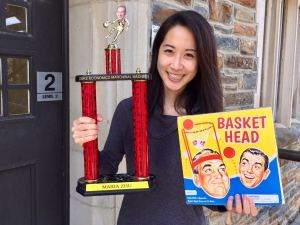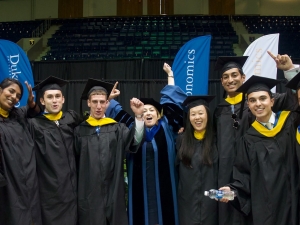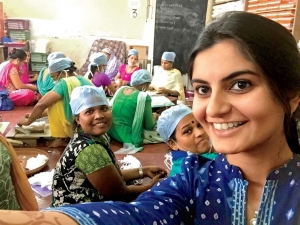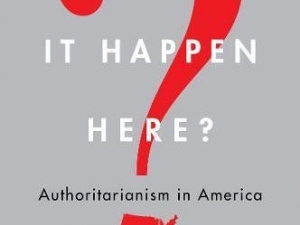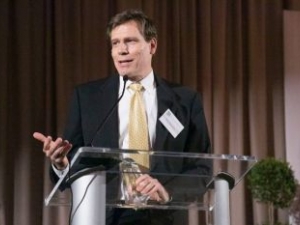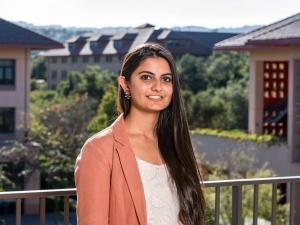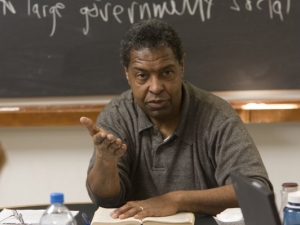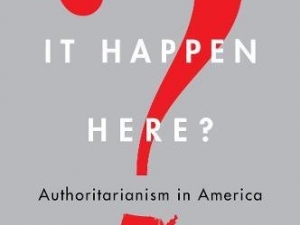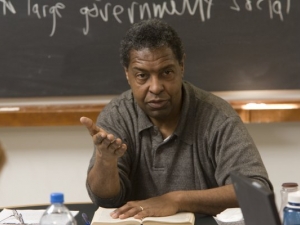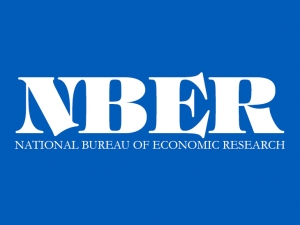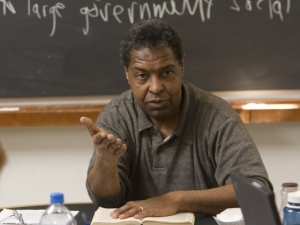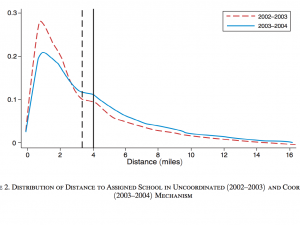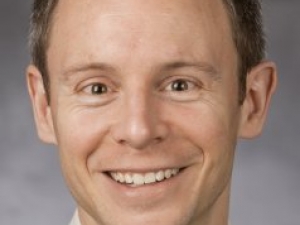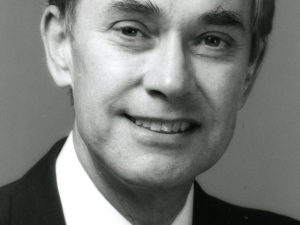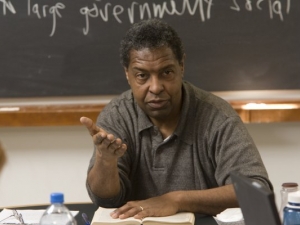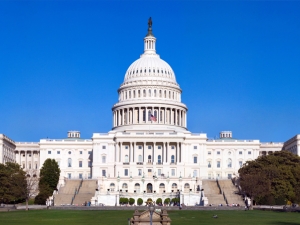The Department of Economics welcomes all members of the Duke community to come learn more about the research our undergraduates have completed as part of the 2017-18 Honors Program. This year, an anticipated 35 honors students are expected to compete for the following awards: Best Honors Thesis; Best Honors Thesis Finalist; Outstanding Symposium Presentation; Outstanding Honors Poster, Faculty Vote; and, Outstanding Honors Poster, Student Vote. Each prize comes with a cash gift, ranging from $200-500. Honors… read more about Department Hosts Honors Program Events on April 24 and 27 »
Three Duke University students — including economics minor Claire Wang — are recipients of the Udall Scholarship, which recognizes students who have demonstrated a commitment to careers in the environment or Native American tribal public policy or healthcare. read more about Three Duke Students Named Udall Scholars »
via Duke Today: "There is no problem that any African country is facing today that hasn't been seen elsewhere and successfully addressed." Célestin Monga, vice president and chief economist of the African Development Bank Group, gave the African Initiative Keynote Lecture on African Economic Futures, on April 2. Monga has held various board and senior executive positions in academia, financial services and international development institutions, serving most recently as managing director at the United Nations Industrial… read more about Said@Duke: Célestin Monga on Africa's Challenges and Future »
This year’s men’s basketball tournament challenge was a tumultuous one, to say the least. The leaderboard for the Duke Economics Marchinal Madness group experienced more volatility than the stock market, and frontrunners fell out of the top spots as quickly as others rose to take their places. But going into the final game on Monday night, first-time bracket challenger Maria Zhu had already secured her victory with a solid 60-point lead over runner-up La’Qwanda Trice. “It feels great to be the winner of the bracket… read more about Ph.D. Candidate Maria Zhu Wins Duke Econ Bracket Challenge »
Duke University has reclaimed the No. 1 spot in a new ranking of best economics colleges for undergraduates in the United States. The remaining top five schools include Harvard, Columbia, University of Chicago, and Georgetown. Duke previously beat Harvard and Yale for the top spot in 2014 and was No. 5 in 2017. The 2018 list, compiled by College Factual, evaluates 435 four-year colleges and universities for overall academic quality as well as “outcomes-focused data.” This includes looking at a variety of factors, such as… read more about Duke Reclaims Title as Best School in U.S. for Economics »
Alumna Suhani Jalota (B.S. '16) has been recognized by Forbes for her work in social entrepreneurship. Jalota is the founder and CEO of the Myna Mahila Foundation, which provides impoverished women in India with affordable health products such as sanitary napkins. read more about 30 Under 30 Asia 2018: Social Entrepreneurs »
Is the United States sliding toward dictatorship? Can the nation reverse course, or is the damage already done? Professor Timur Kuran is among the authors featured in “Can It Happen Here? Authoritarianism in America,” published on Mar. 6. Edited by Harvard Law Professor Cass R. Sunstein, this collection of 17 essays explores the lessons of history, how democracies crumble, how propaganda works, and the role of the media, courts, elections, and "fake news" in the modern political landscape — and what the future of the… read more about ‘Another Road to Serfdom’: Q&A With Timur Kuran »
The import penalties from President Trump's proposed tariffs may not wreak as much economic havoc as opponents fear, but they may not provide the magnitude of relief the White House is promising either. Professor Allan Collard-Wexler weighs in for the Post-Gazette. read more about Trump Touts Tariffs, But Will They Cure the Import Problem? »
Duke Economics senior Anna Kropf, whose honors thesis examines "city-based factors for entrepreneurial attractiveness," explains why Amazon should consider Austin, Philadelphia, and the Raleigh area as the most attractive options for its highly anticipated second headquarters. read more about And the Amazon Winner Should Be ...? »
Alumna Lucy Xiaolu Wang (MAE '14), currently a doctoral candidate at Cornell University, recently sat down with the AEA to talk about prescription drug monitoring programs and how health IT can improve them to reduce the number of opioid-related deaths. read more about Alumna Lucy Xiaolu Wang (MAE '14) on How Health IT Reduces Opioid-Related Deaths »
Professor Allan Collard-Wexler comments for The Washington Post and is cited by The Associated Press regarding his research on mini-mills and productivity gains in the U.S. steel industry. Even if companies themselves benefit from tariffs, they're just not that likely to need many more workers to ramp output, he says. read more about Don't Blame China, Mr. President. Blame the Robots. »
Founder and former CEO of the Vanguard Mutual Fund Group John C. Bogle gave a lecture Friday at Duke University on how investors can get the most out of the market. His advice is simple. Buy and hold: use low-cost index funds to hold the stock market, and hold it “forever.” “That’s been part of my crusade,” he said. “To try to persuade people about the simplicity of using indexing … That’s the winning strategy.” Bogle discouraged falling for the allure and excitement of exchange-traded funds (ETFs), which are higher cost… read more about Vanguard Founder Shares Investment Advice With Duke Students, Local Investors »
Nechyba, who won the 2017 Alumni Distinguished Undergraduate Teaching Award based on nominations from his students, has used his positive vibes to make economics more palatable at Duke—and elsewhere. read more about Professor Thomas Nechyba Turns Economic Concepts into Poetry »
Suhani Jalota, a 2016 Duke University graduate from Mumbai, India, has been named a Knight-Hennessy Scholar at Stanford University. The scholarship will fund her Ph.D. in health policy at the Stanford School of Medicine. Jalota is among 49 recipients selected for the inaugural cohort. read more about Suhani Jalota (B.S. '16) Named to Inaugural Class of Knight-Hennessy Scholars »
Professor William Darity, Jr. has been named a 2018 leader at Duke University for his work on inequality. read more about 2018 Leader: William Darity, Jr. »
Why did the #MeToo movement take off recently and not decades ago, when a group of women accused playwright Israel Horovitz of sexual misconduct? To explain the psychology of when people stay silent and when they speak up, The Hidden Brain asked Professor Timur Kuran to explain preference falsification. read more about The Psychological Forces Behind a Cultural Reckoning: Understanding #MeToo »
From Duke Today: Professor Timur Kuran is among the authors featured in "Can It Happen Here? Authoritarianism in America," a collection of essays exploring the lessons of history, how democracies crumble, how propaganda works, and the role of the media, courts, elections, and "fake news" in the modern political landscape — and what the future of the United States may hold. read more about Professor Timur Kuran Featured Essayist in Upcoming Book »
From Duke Today: Professor Lori Leachman's memoir, out in an e-edition on Jan. 30 and in print in May, tells about a football life in the South from a daughter's perspective. Her father, a noted high school, college, and NFL coach, died from chronic traumatic encephalopathy, a degenerative brain disease found in athletes, military veterans, and others with a history of repetitive brain trauma. read more about Professor Lori Leachman Publishes Memoir »
During his first state of the union speech, President Trump took credit for the reduced black unemployment rate. While it is at an all-time low, the numbers fail to explain why African Americans are still twice as likely to be jobless than white Americans. Professor William Darity, Jr. helps make sense of this all. read more about Running the Numbers on Black Unemployment »
Features Professor David Ridley's work in creating priority review vouchers as part of the FDA review system to incentivize manufacturers to develop drugs for neglected diseases. read more about Medical Miracles From FDA Inefficiency »
Writing for the Harvard Business Review, Professors Steven Sexton and Bryan Bollinger (Fuqua) report findings from their research, which shows that a soda tax won't reduce consumption unless retailers pass along the added cost to their customers. read more about Do Soda Taxes Work? Not Unless Retailers Raise Prices »
Each month, the National Bureau of Economic Research (NBER) selects a handful of working papers to feature. The January 2018 Digest summarizes a paper co-authored by Professor Allan Collard-Wexler that estimates the extent to which market power is a source of oil production misallocation. read more about Faculty Research Featured in NBER Digest »
Based on their research, Professors William Darity, Jr. and Darrick Hamilton (New School) have proposed a new idea to solve wealth inequality in America: Give every newborn a "Baby Bond" account, which can range from $500 to $50,000 in cash. read more about There's a Serious Proposal to Give Babies Born in the United States $20,000 (or More) »
Economists helped New York City design its high school admissions process. In the December issue of the American Economic Review, Professor Atila Abdulkadiroglu and his MIT co-authors evaluate the matching system and say it's making students better off. read more about Making Admissions More Efficient »
Working part-time while in high school or college could have an impact on future wages, according to a new NBER working paper by Duke Economics professors V. Joseph Hotz and Arnaud Maurel, and alumni Jared Ashworth (Pepperdine University) and Tyler Ransom (University of Oklahoma). read more about Students Who Hold Jobs During College Earn More Money After They Graduate »
Duke Department of Economics faculty and graduate students will be attending the 2018 Annual Meeting of the American Economic Association (AEA) on Jan. 5-7, and presenting or participating as chairs, co-authors, discussants, and panelists in 47 sessions. Additionally, Duke Economics Ph.D. job market candidates have interviews scheduled throughout the three-day conference in Philadelphia, Penn. The following is a list of work to be presented at the meeting that have been authored or co-authored by our faculty and students… read more about Faculty, Grad Students Share New Research at 2018 AEA Conference »
Professor Vincent Conitzer, along with a team of researchers at Duke and the University of Maryland, have created a kidney exchange algorithm that attempts to reflect doctors' difficult decisions. read more about Should AI Decide Who Gets a Kidney? »
Allen C. Kelley, a James B. Duke Professor Emeritus of Economics, died Dec. 9 at the age of 80. Kelley was a prominent leader in the profession, and throughout his nearly 50 years as an economist — 38 of which were spent at Duke University — Kelley’s research and writing helped to transform the then-emerging fields of development economics and economic demography. “In the 1970s, the field of development economics had been transformed by a small group who developed the first computational general equilibrium (CGE)… read more about In Memoriam: Prominent Economist Allen C. Kelley Dies at Age 80 »
A new study co-authored by Professor William Darity shows that being the victim of violence can have drastic effects on children's lives, including an increased likelihood of dropping out of high school. read more about New Study Explores Link Between Childhood Violence, High School Completion »
The White House Council of Economic Advisors predicts that corporate tax cuts will increase average household incomes; however, Professor Juan Carlos Suárez Serrato said that when corporate taxes are cut, "more than half of the benefit has gone to owners." read more about Supercharger or Super Wealth-Shifter? Few Promises for Wage Growth as Tax Bills Advance »

